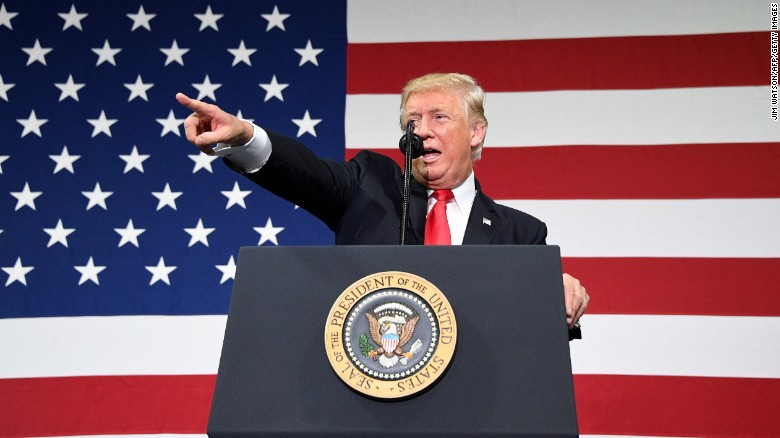Washington (CNN)President Donald Trump argued Friday that Democrats have stood in the way of DACA recipients gaining permanent legal status, while casting Republicans as would-be saviors.
"The Republicans are with you, they want to get your situation taken care of," Trump said at the White House, as he complained about the $1.3 trillion spending bill program, speaking directly to recipients of the Deferred Action for Childhood Arrivals program. "The Democrats fought us, they just fought every single inch of the way. They did not want DACA in this bill."
But as Congress left town increasingly unlikely to pass any major immigration legislation before November's midterms, the White House has repeatedly rejected deals to fix DACA, the Obama-era policy he ended then implored Congress to save.
Here's a timeline of DACA under Trump:
September 5, 2017: Trump announced an end to the DACA program, which protected young undocumented immigrants who came to the US as children from deportation. President Barack Obama instituted the work permits and protections in 2012.
September 13: Trump has dinner with Senate Democratic Leader Chuck Schumer and House Democratic Leader Nancy Pelosi at the White House, after which the two Democrats say they agreed in broad strokes to a DACA-border security deal that doesn't include Trump's wall. Trump initially seems on the same page, then the White House and Republicans walk it back. Trump tweets about how "good, educated and accomplished" DACA recipients are.
October 8: The White House unveils what it calls its priorities for a DACA deal, a laundry list of aggressive conservative immigration measures that Democrats and a handful of Republicans rejected as rife with poison pills.
November 1: After a terrorist attack in New York City, Trump begins to emphasize ending the diversity visa lottery and family-based migration.
November 2: Republican lawmakers meet with Trump at the White House and rule out attaching any DACA deal to year-end funding bill before a possible shutdown.
December 21: Lawmakers pass government funding into the new year and leave town without a deal, despite Democrats' previous pledges to not go home without one.
January 9: Trump holds bipartisan meeting at the White House that cameras televise for nearly an hour. He indicates multiple times he is willing to compromise on DACA, despite some contradictions within the meetings, and says "when this group comes back -- hopefully with an agreement -- this group and others from the Senate, from the House, comes back with an agreement, I'm signing it." The so-called "four pillars" also come out of this meeting -- that a deal shall include DACA, family-based migration, the diversity lottery and border security.
January 9: Federal court puts hold on Trump's plan to end DACA, ordering renewals of permits to continue but no new applications.
January 11: After months of meetings, Democrat Dick Durbin and Republican Lindsey Graham go to the White House to propose to Trump a compromise worked out by their group of six bipartisan senators. The offer includes a path to citizenship for eligible young immigrants, the first year of Trump's border wall funding, ending the diversity visa lottery and reallocating those visas, and restricting the ability of former DACA recipients to sponsor family.
Trump and the White House invite hardline Republicans to the meeting and he rejects the deal, making his now-infamous "shithole countries" comment in the process.
January 19: House before a government funding deadline, Schumer and Trump meet for lunch at the White House. Schumer offered Trump the upwards of $20 billion he wanted for his border wall in exchange for a pathway to citizenship for the eligible immigrant population. The deal is rejected, and government shuts down at midnight.
January 22: Government reopens after Republicans Graham and Jeff Flake secure a public commitment from Senate Majority leader Mitch McConnell to hold a future immigration floor vote. Bipartisan negotiations resume.
January 25: White House releases its proposal for a DACA deal under the four pillars, which includes a generous path to citizenship for eligible immigrants, but also a number of impossible-to-swallow provisions for Democrats and some Republicans under the auspices of family-based migration and border security.
February 14: A bipartisan group of senators unveils a compromise plan, which includes $25 billion for the border, a pathway to citizenship for the immigrants, cuts to one slim category of family-based migration and prevents the parents who brought their children to the US illegally from ever being sponsored for citizenship by those children.
February 15: White House goes all out to stop the bipartisan compromise deal, which fails to get the necessary 60 votes in the Senate, with 54 votes.
February 26: Supreme Court declines to take up an immediate appeal of court decisions resuming DACA renewals, ensuring no deportations of DACA recipients for months and taking pressure of Congress.
March 14: With roughly a week to go before the major government spending package known as the omnibus must pass, White House suddenly signals a desire for a DACA-border deal. Publicly, the White House says they oppose a temporary fix.
March 22: Congress passes an omnibus without DACA, virtually ensuring it will not be addressed before midterms.
March 23: Trump signs the omnibus, rails on Democrats for, he says, not caring about DACA.




